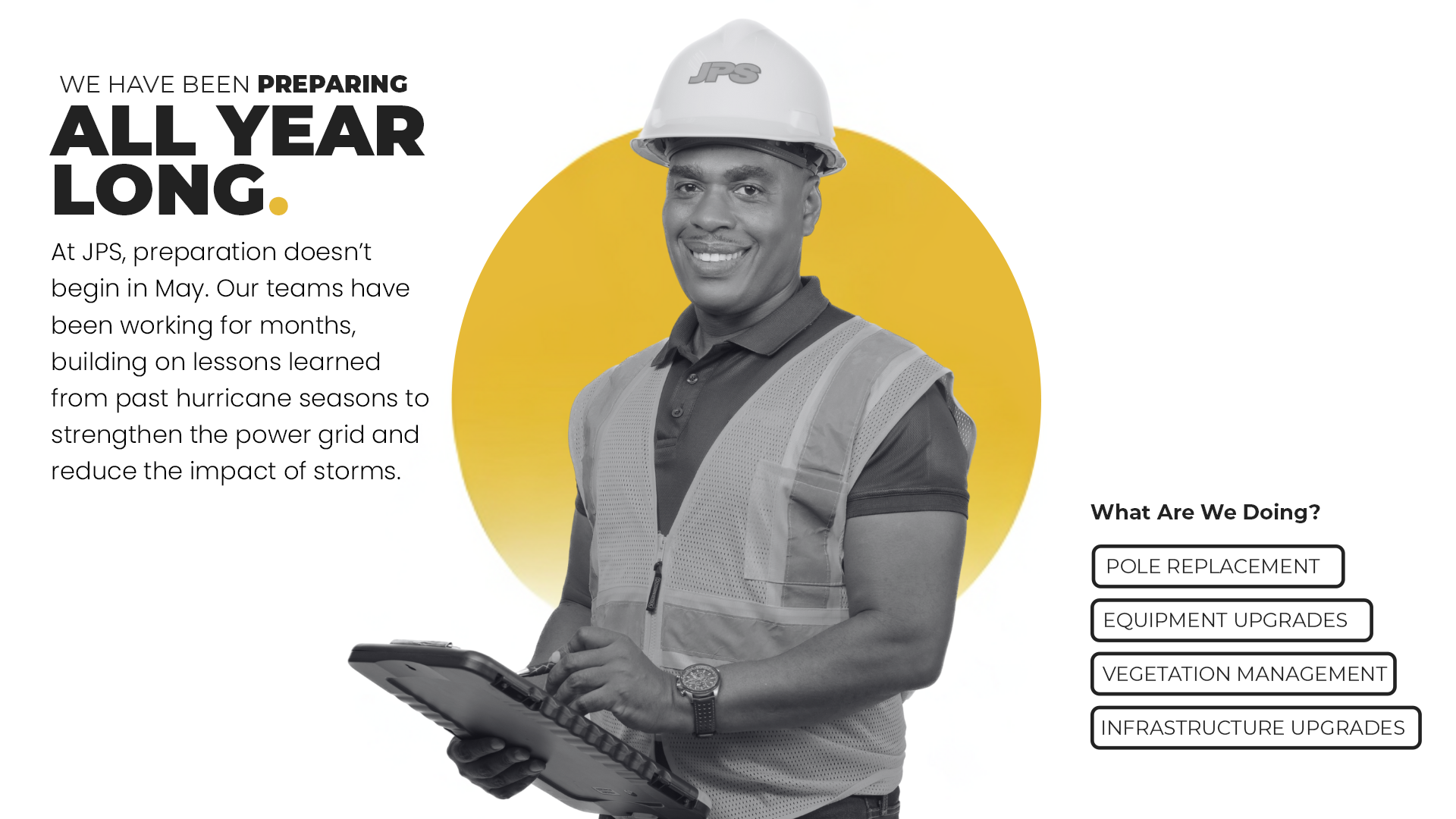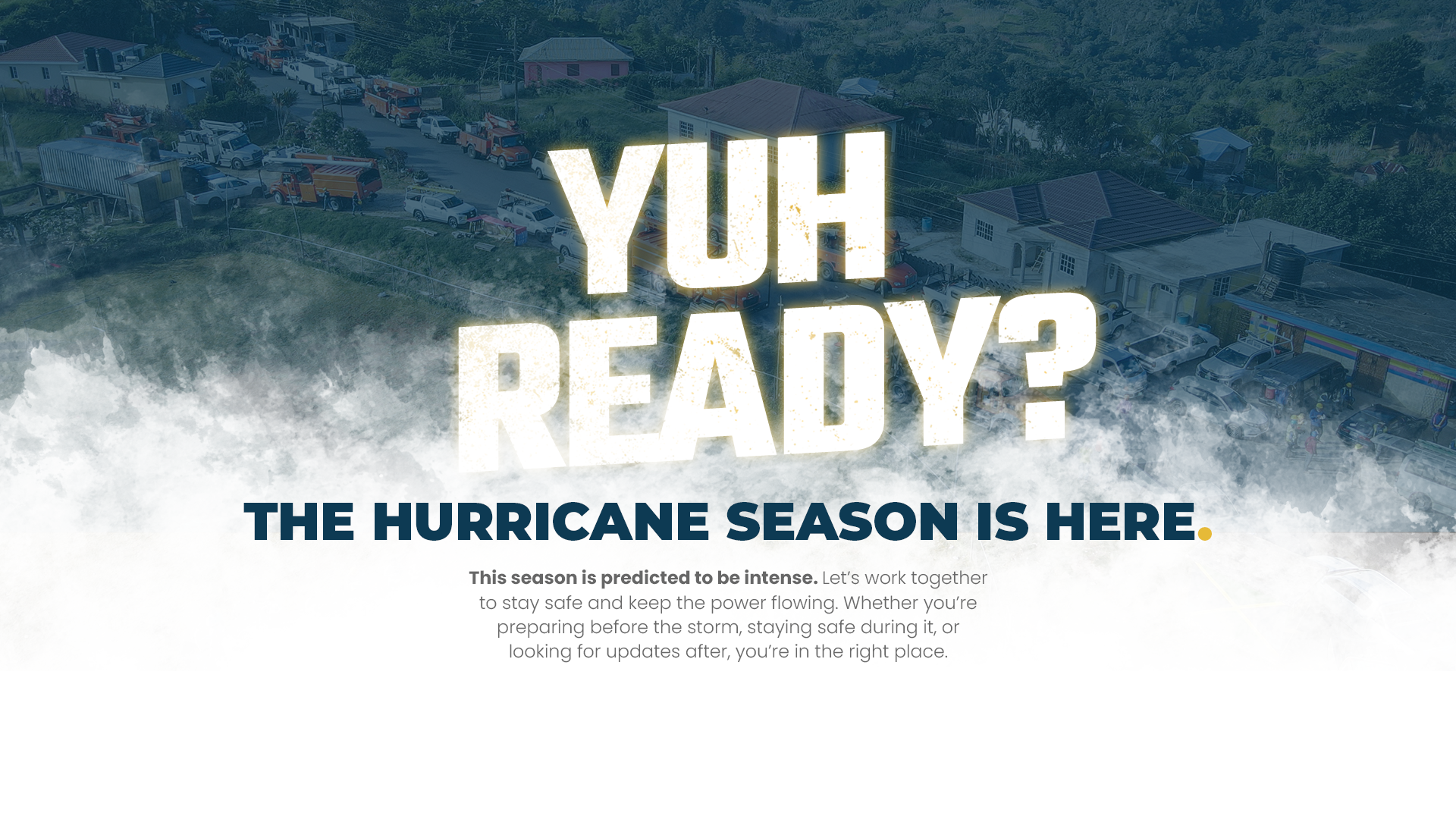
How We Prepare
Hurricanes Don't Wait, Neither Do We!
Pole Replacements
Every year, JPS replaces hundreds of aging or storm-damaged utility poles across Jamaica. This isn't just maintenance—it's strategic. Stronger poles mean a stronger grid, and that means more communities stay connected, even when nature pushes back.
What This Means for You:
-
Fewer outages during storms because poles are less likely to fall or snap.
-
Faster restoration after a storm because the infrastructure holds up better—less to rebuild from scratch.
-
Improved safety: Strong poles mean fewer downed lines and hazards in your community.
-
Long-term savings: Upgrading now reduces the need for emergency work later.
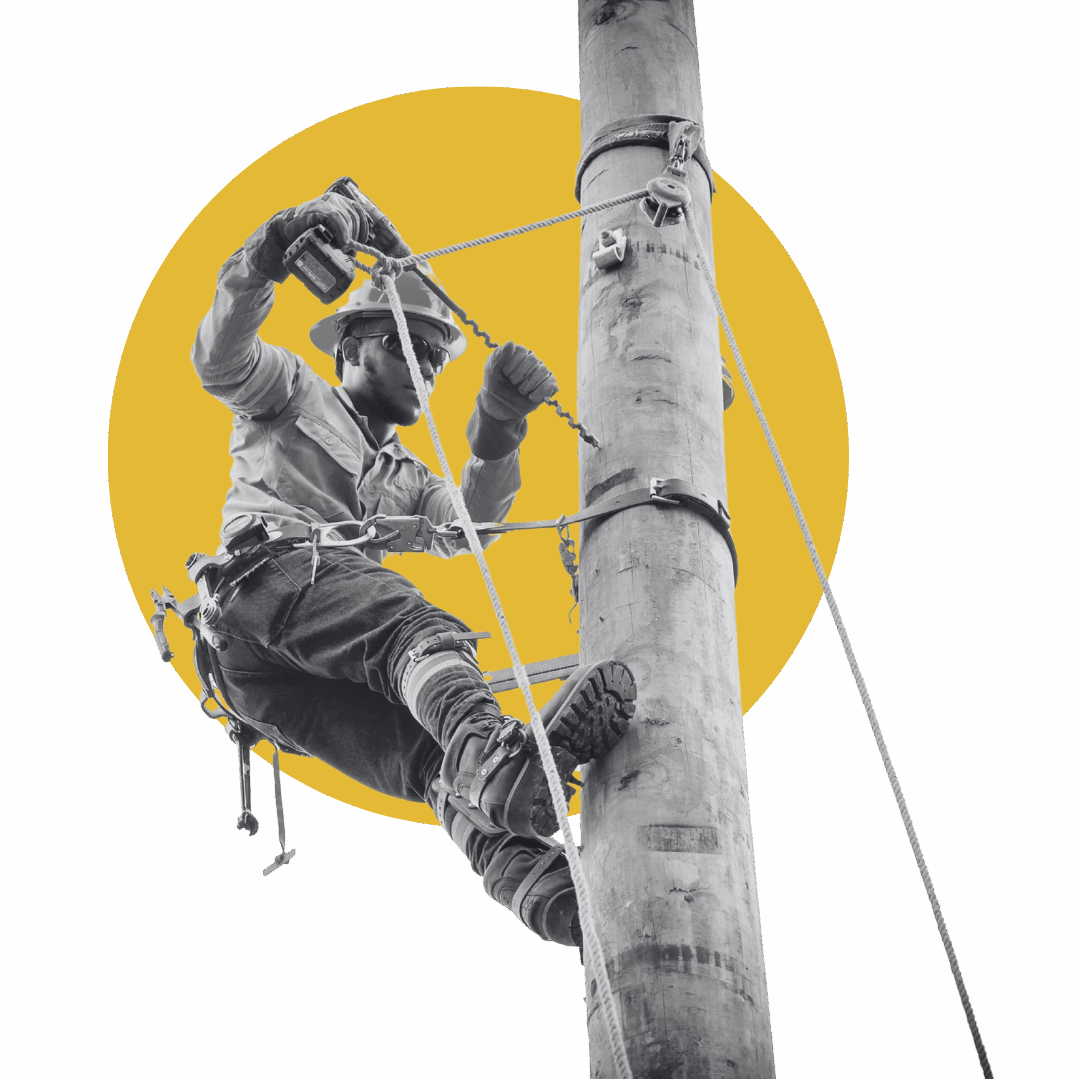
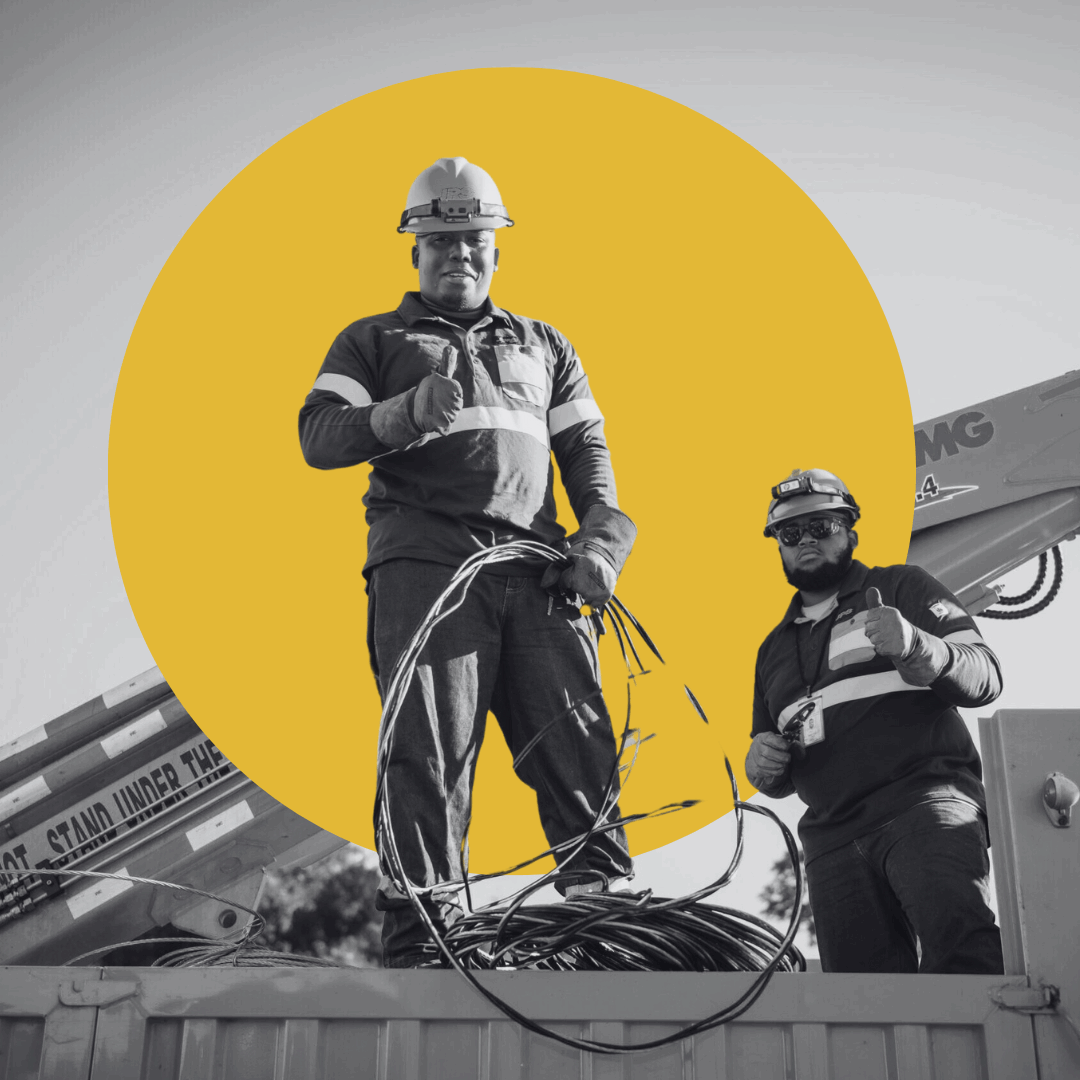
Equipment Upgrades
JPS has been actively upgrading its infrastructure to make the electricity grid more resilient and responsive especially during the hurricane season.
🌀 Why It Matters:
These upgrades mean that even when a storm hits, the grid is better equipped to absorb the shock. Smart systems allow us to quickly identify the problem, reduce the spread of outages, and get you back online faster.
Vegetation Management
When trees and branches grow too close to power lines, they become a major threat—especially during hurricanes. JPS has been intensifying vegetation management islandwide to reduce the risk of outages and speed up storm recovery.
🌪️ Why It Matters:
During a storm, even a single branch can bring down a power line, cut off service, or delay restoration. By trimming vegetation early and often, JPS is making the grid more storm-resistant fewer outages, faster restoration, and safer neighbourhoods.
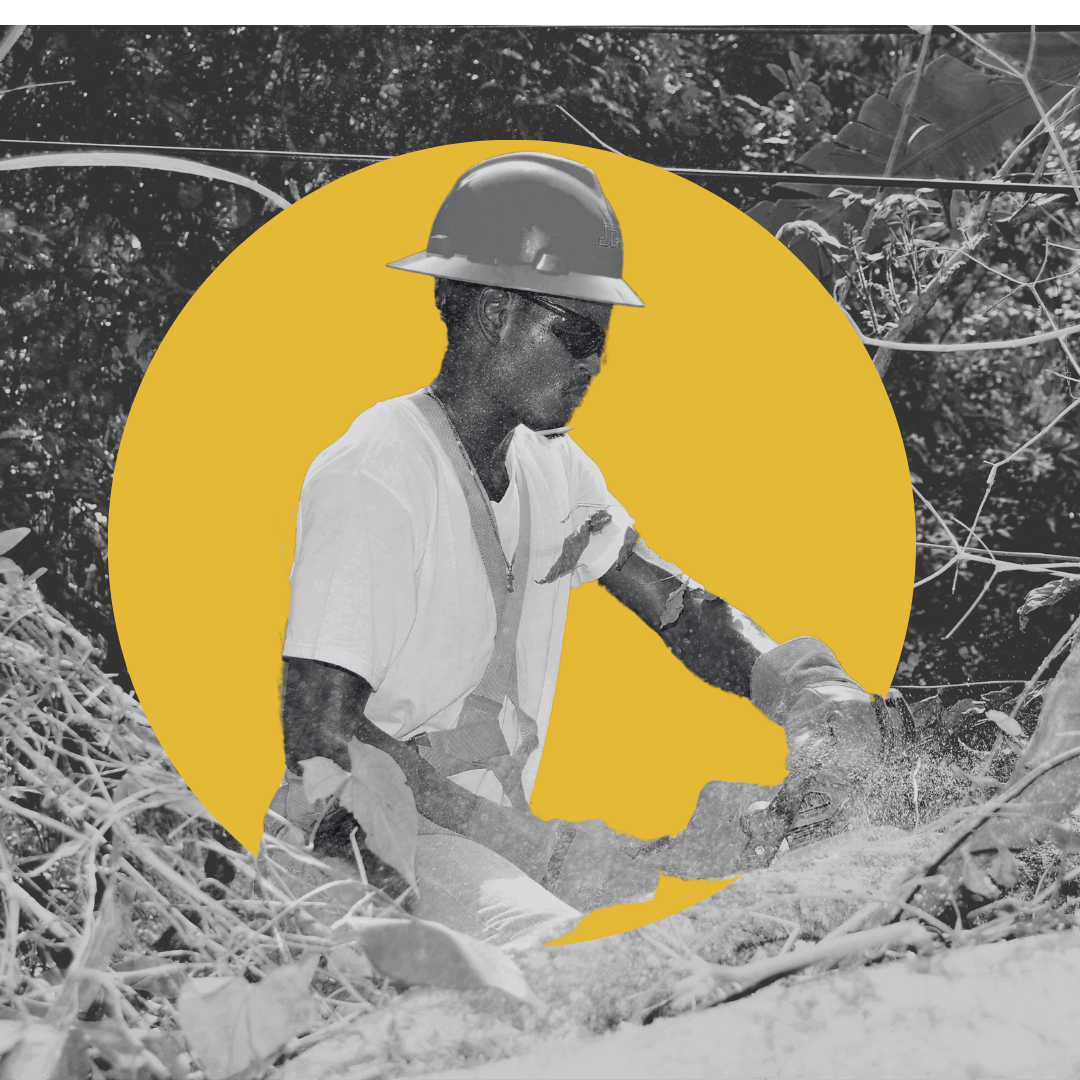
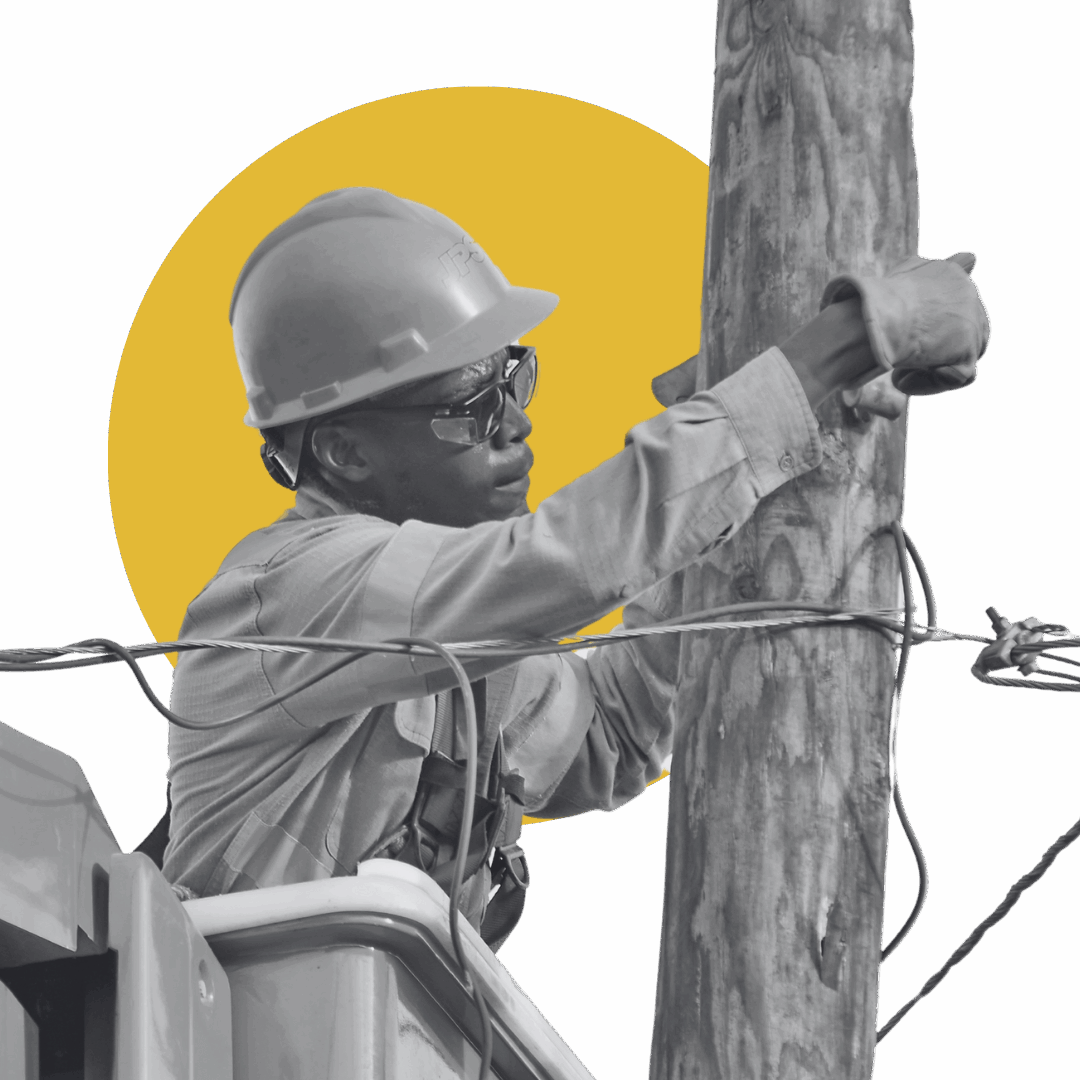
Infrastructure Upgrades
Behind the scenes, JPS has been making critical upgrades to the power grid not just to maintain service, but to make it more storm-resistant than ever before.
💡 Why It Matters:
Every upgrade improves grid reliability, helping to prevent outages where possible and reduce downtime when damage does occur. This means faster service restoration, less disruption to homes and businesses, and a stronger, more resilient power system for all Jamaicans.
Tips For Your Hurricane Preparedness
Check out some more tips and resources for hurricane Safety
🔦 Prepare for Outages
Power cuts can happen suddenly during storms. Build your emergency supply kit now so you’re not scrambling later.
Tips:
-
Buy flashlights (avoid candles where possible).
-
Get a battery-powered radio for updates.
-
Charge all devices before the storm starts.
-
Freeze water in containers to keep food cold longer.
-
Fill up your gas tank in case of gas station closures.
-
If you own a generator:
-
Test it now.
-
Ensure it’s installed outdoors with the right transfer switch.
-
🌴 Trim Trees Safely
Storm winds turn overgrown trees into serious hazards. Keep them in check before the season peaks.
Tips:
-
Cut trees or branches that hang over your roof or power lines.
-
Do not touch trees near live wires—call JPS or a certified arborist.
-
Keep 10 feet of clearance between trees and service lines.
-
Dispose of branches and cuttings so they don’t block drainage paths.
-
If your area gets JPS line maintenance, keep the path clear.
🔌 Check & Secure Electrical Installations
A damaged electrical setup can cause fires or delays in restoring your service. Inspect your system now.
Tips:
-
Look for loose wires, rusted meter bases, or cracked conduit.
-
Check that solar panels are bolted down and in good shape.
-
Get a licensed electrician to:
-
Fix exposed wires
-
Install proper surge protection
-
-
Unplug electronics if your home starts to flood or spark.
🧹 Clear Debris from Your Yard
Flying debris isn’t just messy—it can break windows or damage power lines. Secure everything early.
Tips:
-
Bring in loose items like:
-
Flower pots
-
Plastic chairs
-
Tools
-
Bamboo blinds or tarpaulins
-
-
Secure gas cylinders and water tanks with straps or concrete blocks.
-
Clean gutters and drains to prevent water backup.
-
Have a tarp ready for any roof leaks or damage.
📱 Stay Connected with JPS
You’ll need updates before, during, and after a storm make sure JPS can reach you.
Tips:
-
Download the MyJPS App to report outages & track updates.
-
Save the JPS hotline: 888-CALL-JPS / 888-225-5577
-
Update your contact info so we can send alerts via text & email.
-
Follow @myjpsonline on Instagram, Twitter, and Facebook.
-
Turn on notifications for key platforms during storm weeks.
🧯 Know When & How to Shut Off Your Power
In some cases, turning off your power can prevent electrical fires, shocks, or equipment damage—especially during flooding.
✔️ Practical Tips:
-
Learn how to safely switch off your home’s breaker panel.
-
If water enters your home or you hear buzzing/flickering, turn off power at the main breaker immediately.
-
Never touch breakers or outlets with wet hands or while standing in water.
-
Label your breakers now, so you know which switch controls what.
-
For major appliances (especially fridges, AC units), unplug them if flooding is likely.
-
Unsure? Call a licensed electrician before the storm to walk you through the steps.
ARE YOU READY FOR THE HURRICANE SEASON?
ANSWERS TO FREQUENTLY ASKED QUESTIONS
Will I lose electricity if a hurricane affects Jamaica?
It’s best to be prepared for power outages. Strong winds and heavy rain from a hurricane can cause damage to the power system, resulting in outages. And, depending on the severity of the hurricane, JPS may make a decision to proactively shut down the grid to limit damage to the network.
How is JPS preparing for the Hurricane Season?
JPS’ preparation for the hurricane season starts almost as soon as one season ends. We focus on structural integrity – strengthening the power delivery network by replacing poles and lines, and upgrading equipment. We also pre-order and stockpile material, in anticipation of the increased demand for these items to repair the grid after a hurricane.
An intensive ongoing vegetation management programme is implemented to reduce the impact of trees on the power lines, in the event of a storm or hurricane. The removal of ‘danger trees’ that could cause power outages is an important part of JPS’ hurricane preparations. The company is therefore working with contractors across all parishes to remove trees that threaten power lines. JPS is also urging customers to keep their trees from growing close to the power lines.
People preparation is an integral part of hurricane preparations. We ensure proper training of staff and contractors. Several hurricane drills are carried out before the start of the hurricane season, to ensure team members are familiar with their storm roles and ready to respond in the event of a hurricane.
JPS has also established formal arrangements with local and overseas partners, so we can call on additional resources if the need arises.
How should customers prepare for the season?
Here are five (5) things you need to do, as the hurricane season approaches
- PREPARE FOR OUTAGES: Make sure you have back-up lighting such as flashlights, candles or lamps. Get a battery-powered radio and extra batteries. If you have a generator, get it serviced and have adequate fuel on hand. When a hurricane threatens, charge up your phones and other devices, and turn your refrigerator to its coldest setting, so it stays cool longer.
- CUT TREES: Where it is safe to do so, trim trees around your property to prevent them from falling on power lines or your house. If the trees are already close to, or touching the lines, contact JPS for advice and /or assistance.
- CHECK & SECURE ELECTRICAL INSTALLATIONS: Check your service wires, solar panels and other installations. If you notice loose or exposed wires, corrosion or rust, get a licenced electrician to fix them now.
- CLEAR DEBRIS FROM YOUR YARD: Remove items that could be blown away and become missiles, putting you and others at risk. Secure outdoor furniture, gas cylinders, and other items that could be dislodged by strong wind or flooding.
- CONNECT WITH JPS: Download the MyJPS Mobile App, so you can keep in touch with JPS before, during and after a storm with the. Also, make sure that JPS has your current cell phone number and email address, so we can send you regular updates and important information to help you through the hurricane and the restoration process.
Will JPS cut customers’ trees?
JPS is not responsible for the maintenance of trees on private property. However, where there are safety concerns, JPS will provide guidance and assistance. If the tree on your property is close to, or already touching the power lines, contact JPS. Do not attempt to cut trees that are close to power lines.
It is very important to keep your trees from growing into power lines, in the first place. If you already have trees that could grow into the lines, keep them pruned to avoid contact.
Better yet, we recommend that you protect your electricity supply by removing all trees that could grow into the power lines. Replace them with plants that will not grow tall enough to touch the lines. Safe and attractive options include crotons, bougainvillea, Jamaican cherry and dwarf coconut palms. Large trees like mango, otaheite apples, ackee, or bamboo, should be planted at least 10 feet away from power lines.
What exactly is JPS doing to reduce power cuts during the hurricane season?
We are investing in smart grid technology to help improve service reliability and make the grid more resilient. The smart technology will limit the extent of outages and the number of customers affected, and also make it easier to restore supply after a hurricane. In addition, our ongoing maintenance programme involves a number of activities to reduce the impact of adverse weather conditions on the grid. These activities include: pole replacement and repair, and infrastructure and equipment upgrades.
Why doesn’t JPS put the lines underground to reduce the number of power cuts?
While there are advantages to having lines underground, it could cost up to 10 times more to have an underground network, compared to an overhead network. This is not a cost JPS’ customers are willing to pay at this time.
Do I need to turn off my breaker when the hurricane starts?
You will need to turn off your circuit breaker if there’s a risk of flooding in your home, if you have to evacuate, or if the power supply gets unstable because of strong winds. Make sure family members know where to find the breaker and how to turn it off.
I have a generator, but I haven’t used it in a while – do I need to have it serviced even though I might not need it?
Yes, get your generator thoroughly checked by a professional.
Have More Questions?
Before The Storm FAQ's
During The Storm FAQ's
After The Storm FAQ's
If I lose power during a hurricane, how long will it take to restore it?
4 Step Process of Power Restoration: Electricity restoration after a hurricane involves a number of critical steps that must be followed for maximum efficiency and the safe return of service to customers. To expedite the restoration process, where possible, we carry out several of these steps simultaneously, but it is essential that we observe the restoration protocol. Hastening the process without following these steps could significantly compromise the integrity of the power system, your safety, and our restoration efforts in the long run.
STEP 1
Checking and Repairing Power Plants & Main Transmission Lines
Our first priority is to inspect the entire power system for damage. This is necessary so we can first identify and fix any damage to the power plants and the main transmission lines that take power from our generating stations. If there are problems with these parts of the system, then it may be physically impossible to generate and get power to you.
STEP 2
Getting Power To Essential Services
Once it is safe to start turning the lights back on, electricity is first restored to the main lines that provide electricity to essential services such as hospitals, airports, communication systems, and water supply facilities.
STEP 3
Fixing Large Power Lines Serving the Largest Number of Customers
The next stage in our restoration is to get as many customers as possible restored quickly by repairing those large distribution lines that serve several communities.
STEP 4
Fixing Smaller Power Lines
Having fixed the larger power lines, attention is now turned to fixing the smaller power lines serving smaller groups of customers.



